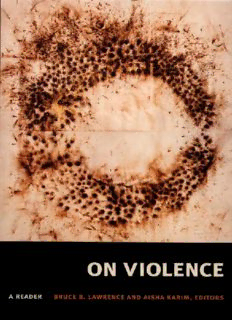
On Violence: A Reader PDF
Preview On Violence: A Reader
ON VIOLENCE on duke university press durham and london 2007 violence a reader Edited by Bruce B. Lawrence and Aisha Karim ∫ 2007 Duke University Press All rights reserved. Printed in the United States of America on acid-free paper $ Designed by Amy Ruth Buchanan. Typeset in Minion and Meta by Keystone Typesetting, Inc. Library of Congress Cataloging-in-Publication data appear on the last printed page of this book. Duke University Press gratefully acknowledges the support of the Harry Frank Guggenheim Foundation, which provided funds toward permission costs of this book. FOR JAMES HESTER AND KAREN COLVARD, pillars and pioneers of research on violence CONTENTS Acknowledgments ix General Introduction: Theorizing Violence in the Twenty-first Century 1 PART I. THE DIALECTICS OF VIOLENCE 17 Georg Wilhelm Friedrich Hegel, Phenomenology of Spirit 27 Friedrich Engels, Anti-Dühring 39 Karl Heinrich Marx, Capital: A Critique of Political Economy 62 Frantz Fanon, Concerning Violence (The Wretched of the Earth) 78 PART II. THE OTHER OF VIOLENCE 101 ACTORS Mohandas K. Gandhi, Hind Swaraj, or Indian Home Rule 110 Adolf Hitler, The Right of Emergency Defense (Mein Kampf ) 127 Malcolm X, The Ballot or the Bullet 143 CRITICS Antonio Gramsci, Selections from the Prison Notebooks 158 Raymond Williams, Keywords; Marxism and Literature 180 Pierre Bourdieu, Outline of a Theory of Practice 188 James C. Scott, Domination and the Arts of Resistance 199 PART III. THE INSTITUTION OF VIOLENCE: THREE CONNECTIONS 215 FAMILIAL Sigmund Freud, Group Psychology and the Analysis of the Ego 226 Linda Gordon, Social Control and the Powers of the Weak (Heroes of Their Own Lives) 245 Del Martin, Battered Wives 255 LEGAL Bruce B. Lawrence, The Shah Bano Case (Shattering the Myth) 262 Walter Benjamin, Critique of Violence (Reflections) 268 Catharine MacKinnon, Feminism, Marxism, Method, and the State: An Agenda for Theory 286 Robert M. Cover, Violence and the Word 292 Chandra Muza√ar, Human Rights and the New World Order 314 RELIGIOUS René Girard, Violence and the Sacred 334 James Cone, Liberation and the Christian Ethic (God of the Oppressed) 351 Sharon Welch, Dangerous Memory and Alternate Knowledges (Communities of Resistance and Solidarity) 362 Simone Weil, The Iliad, or the Poem of Force 377 PART IV. THE STATE OF VIOLENCE 391 Thomas Hobbes, Leviathan 399 Hannah Arendt, The Origins of Totalitarianism 416 Michel Foucault, Discipline and Punish: The Birth of the Prison 444 Gilles Deleuze and Félix Guattari, Savages, Barbarians, and Civilized Men (Anti-Oedipus) 472 PART V. THE REPRESENTATION OF VIOLENCE 491 André Breton and Leon Trotsky, Manifesto: Towards a Free Revolutionary Art 498 Michael Taussig, Shamanism, Colonialism, and the Wild Man: A Study in Terror and Healing 503 Kristine Stiles, Shaved Heads and Marked Bodies: Representations from Cultures of Trauma 522 Osama bin Laden, Declaration of War against the Americans Occupying the Land of the Two Holy Places / Roland Jacquard, In the Name of Osama Bin Laden: Global Terrorism and the Bin Laden Brotherhood 539 Elliott Leyton, Touched by Fire: Doctors without Borders in a Third World Crisis 547 Copyright Acknowledgments 555 Index 559 viii contents ACKNOWLEDGMENTS A work of this scope and complexity covers many years in the life of an in- dividual, and in the case of On Violence there were many stages from its incep- tion as an idea to its completion as a book nearly fifteen years later. We cannot begin to recapitulate all those who have assisted in the process. For Bruce Lawrence, the first editor, the chain of gratitude extends back to Bruce Kapferer, now a professor of anthropology at the University of Ber- gen. While Lawrence and Kapferer were serving on the board of advisors for the religion initiative at the Harry F. Guggenheim Foundation during the early 1990s, they conceived of this project and worked together on prelim- inary drafts. Graduate students at Duke University then stimulated and as- sisted the continuation of the project, and when Aisha Karim became fully committed to its completion, she also agreed to become a coeditor. Other graduate students at Duke University who worked on the project include Randy Styers, Scott Kugle, Ann Burlein, Youshaa Patel, and, especially in the final stages, Brett Wilson. Undergraduates have also done time in tracking down sources and proofreading, with Alex Barna and Sandra Hernandez deserving special mention. Another undergraduate student, now a professor in his own right, Louis Ruprecht Jr., provided the keen eye that led to the inclusion of the segment from Simone Weil, and to Lou the editors owe yet one more debt of gratitude. On Violence would never have been possible without James Hester, president emeritus of the Harry Frank Guggenheim Foundation, and Karen Colvard, the foundation’s senior program o≈cer. Both helped in so many ways that the editors, happily and humbly, dedicate the book to them. Karen Colvard, in particular, had the intelligence, the energy, and the patience without which a project like this could never have been imagined, much less achieved its final apotheosis as a book. Both editors express an open, and deep, gratitude to her, as also to James Hester. Bruce Lawrence has also been assisted by his partner, miriam cooke, at every stage. She has read and commented on parts of the manuscript. She has helped to make sense of gaps in its initial organization, and she has been a catalyst for many of the good ideas that appear in the introductions. Neither miriam nor anyone other than the editors, however, is responsible for the flaws that a book like this must, and always will, contain. The editors have struggled with a topic, an issue, and a problem that exceeds the bounds of both common sense and
Description: